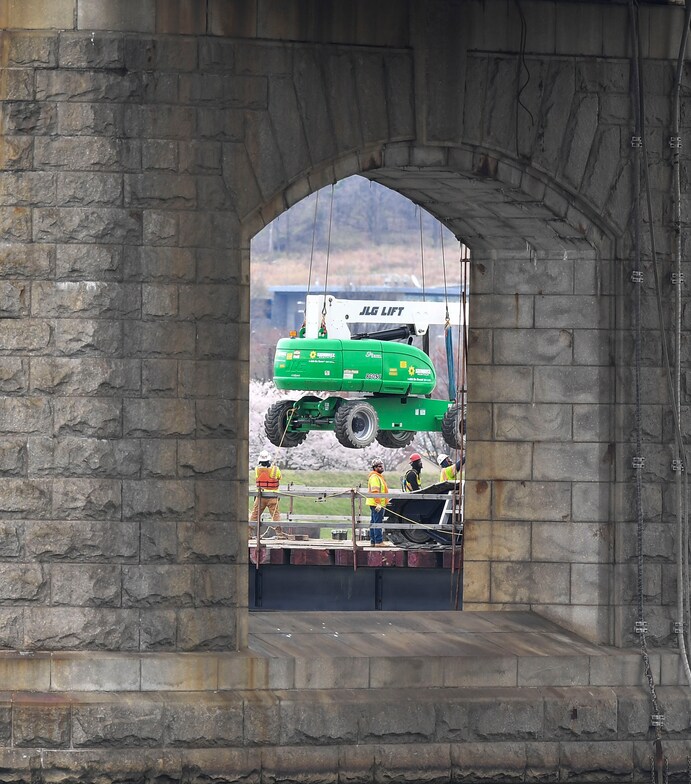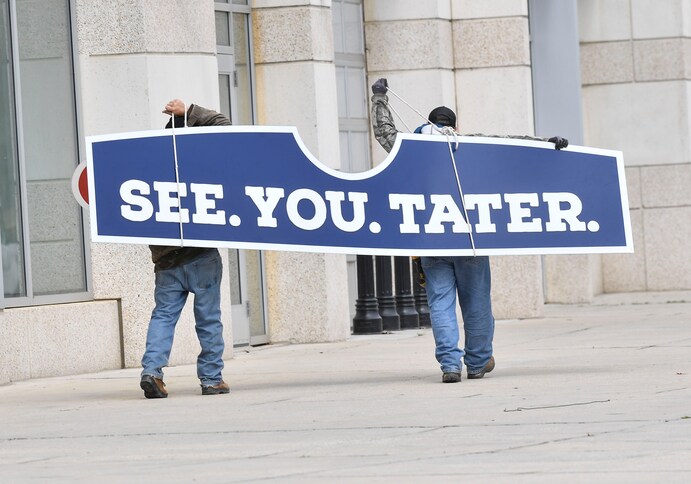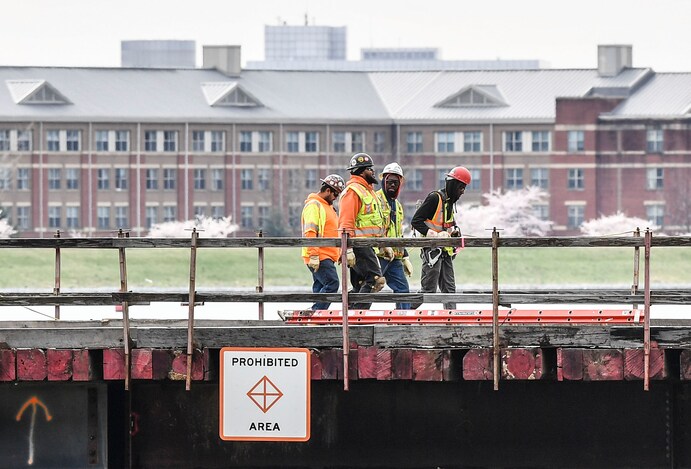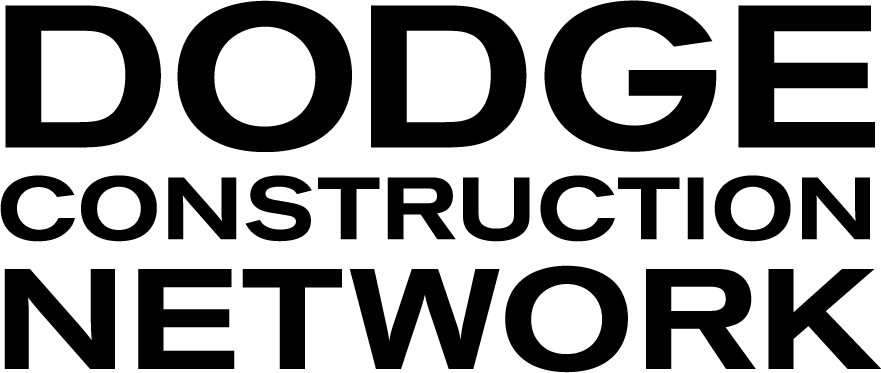Work on region’s big projects continues amid coronavirus, with construction an ‘essential’ business

Construction workers use a lift while working on a new apartment complex by Nationals Park in the District on Tuesday, March 24. (Ricky Carioti/The Washington Post)
Eight days after mostly isolating herself in her Northwest Washington home, Peggy Pacy heard an asphalt paver rumble past her front door.
Amid the global coronavirus pandemic, D.C. Mayor Muriel E. Bowser (D) had urged residents to stay home and practice social distancing. Yet the city had decided this was the time to send out a crew to repave her street.
“We’ve got 20 workers right on top of each other,” Pacy said. “They’re screaming over their equipment, so they’re talking to each other four inches away from each other, which is not a good idea.”
Pacy isn’t the only one noticing construction continuing amid the covid-19 outbreak — and is concerned about the public health consequences.
Infrastructure projects across the Washington region, from routine road maintenance to major transit and highway expansions, are progressing apace even as efforts to limit the spread of the potentially deadly virus have brought much of the region to a standstill.
Some transportation projects are accelerating work by taking advantage of significantly lighter traffic to expand lane closures and work hours.
[What is an essential business in Maryland, D.C. or Virginia?]
Construction workers on the Frederick Douglass Memorial Bridge by Nationals Park in the District on Tuesday, March 24.
While shuttering many businesses to try to slow the virus’s spread, officials in the District, Maryland and Virginia have designated construction as “essential,” along with hospitals, grocery stores, banks and a handful of other businesses. All three jurisdictions have also allowed private construction, including home building and commercial developments, to continue.
Washington-area officials wouldn’t elaborate on why they exempted construction from shutdown orders.
“We classified construction as essential in alignment with federal guidelines,” said Michael Ricci, spokesman for Maryland Gov. Larry Hogan (R).
Alena Yarmosky, spokeswoman for Virginia Gov. Ralph Northam (D), said the federal government and nearly all states with business closure orders had determined construction to be essential.
[Construction on mansions and luxury condos continues in the Bay Area during shelter-in-place]John Falcicchio, Bowser’s chief of staff, said the District, Maryland and Virginia agreed earlier this week to follow the federal guidance declaring construction essential work.
“In any business that is open,” Falcicchio said, “our guidance to them is that in all manners necessary to practice social distancing.”
Construction has been deemed critical or essential in at least 16 states with business-closure orders as of Friday afternoon, according to the Associated General Contractors of America.
However, several states, including Pennsylvania and Vermont, have mostly banned or suspended all but emergency construction work as unnecessary during a public health crisis.

Construction workers on the Douglass Bridge on March 24.
Washington state’s transportation department has suspended work on almost all of its projects. Gov. Jay Inslee (D) also clarified his stay-at-home order Wednesday to say commercial and residential construction were generally prohibited “because construction is not considered to be an essential activity.”
On Friday, New York Gov. Andrew M. Cuomo (D) suspended all but “essential” construction.
In Boston, Mayor Martin Walsh (D) has prohibited construction, citing “the safety and health of construction workers.” His order contrasts with that of Massachusetts Gov. Charlie Baker (R), who deemed it essential and is pushing cities and towns to keep projects open.
Construction industry leaders say transportation infrastructure — including streets, bridges and transit systems — must be maintained to move goods and critical workers.
However, it’s unclear why expansions of the transportation system — the construction of the $2.4 billion light-rail Purple Line in Maryland, and the widening of Interstate 66 and the $5.8 billion extension of Metro’s Silver Line in Northern Virginia — would be considered immediately critical to daily life.
Industry officials say postponing such massive projects would have tremendous financial consequences for governments by upending carefully calibrated years-long schedules and potentially adding millions in delay costs.
Maryland transportation officials declined to comment on the potential cost of postponing work on the Purple Line. However, the state and its contractor previously said the cost of delays related to a federal lawsuit against the project would run between $433,000 and $750,000 per day, according to a court filing by the state and subsequent claims filed by the contractor.
Contractors and unions representing construction workers say the industry has long played a leading role in the country’s recovery, whether rebuilding washed-out roads after floods or downtown Manhattan and the Pentagon after the Sept. 11, 2001 terrorist attacks.
“We’re always there behind the first responders, and this case is no different,” said Sean McGarvey, president of North America’s Building Trades Unions.
They said the industry has a strong track record of following strict safety rules, including those that now protect workers from the novel coronavirus, such as routinely wearing leather gloves, safety glasses and often face masks. Most construction workers also routinely use their own hand tools, and many bring wipes to clean grimy hands at the end of a shift, they said.
[Known coronavirus cases in Washington region top 1,000 amid surge in testing and continuing spread]In addition, industry leaders said, construction firms are quickly implementing new federal public health guidelines. Those include requiring workers to remain six feet apart when possible and having hand-washing stations or hand-sanitizer dispensers. Some are wiping down equipment and port-a-johns more frequently.
Some companies are staggering shifts to have fewer people on site at one time and sending out safety reminders via email, radio or phone calls rather than gathering for the usual start-of-shift meetings. Some have replaced the traditional communal water cooler with bottled water.
Even so, construction workers often work in groups, hoisting beams, handing off equipment and sharing port-a-johns — activities that sometimes require being closer than six feet of each other and touching the same surfaces. On Washington-area construction sites last week, workers could be seen talking, walking and standing within several feet of each other.

Two workers carry a sign down the sidewalk outside Nationals Park on March 24.
While construction workers understand the potential risks of contracting the virus, union leaders said, most are more worried about getting laid off than getting sick.
Joshua VanDyke, of the Washington region’s chapter of the International Union of Operating Engineers, said he’s received dozens of calls from operators of bulldozers, cranes and excavators.
The calls “aren’t about the dangers of contracting coronavirus on the job,” VanDyke said. “It’s more a concern of, ‘Will I have a job tomorrow?’ ”
Construction unions and associations of contracting firms said they haven’t been shy about flexing their political muscle to stay open. The industry is responsible for 7.3 million jobs nationwide and 4.5 percent of the economy, according to the U.S. Bureau of Labor Statistics.
They have been lobbying the Trump administration and governors across the country to designate construction as an “essential” business.
[Grading the region’s coronavirus response: Hogan 1st, Northam last, and Bowser in the middle]Brian Turmail, spokesman for the Associated General Contractors of America, said his members have sent more than 60,000 emails to the Trump administration and are lobbying Congress with the message that construction is “an essential part of the economy.”
“We can continue to operate safely, and we should,” Turmail said. “I don’t think anyone wants to inflict unnecessary economic pain.”
In Virginia, where traffic volumes have fallen up to 60 percent, the state’s Department of Transportation has approved extended hours for lane closures, including outside off-peak hours to give contractors “enhanced flexibility,” the agency said.
One VDOT employee in Northern Virginia tested positive for coronavirus and is self-isolating, the agency said. The facility where the employee worked was immediately closed for cleaning and disinfecting, and other employees there were notified.
A contractor’s employee on the $3.7 billion I-66 expansion project who tested positive for coronavirus self-quarantined March 13 and “has made a full recovery,” the agency said. The contractor notified others who might have been exposed.
VDOT has seen no increase in absenteeism, the agency said.
[New Frederick Douglass Memorial Bridge is midway to completion]Officials with the District Department of Transportation said they haven’t added any new or unplanned work and are continuing 20 projects. They include a new Frederick Douglass Memorial Bridge, the largest infrastructure project in city history, valued at $480 million.
D.C. guidance specific to construction sites directs companies to have cleaning and disinfecting protocols and to space workers at least six feet apart. In tight spaces where such distancing isn’t possible, the guidelines say, companies should shrink the size of their crews and sequence work to have fewer people on site.
If a worker tests positive for coronavirus, all companies on the site must be notified, common and high-touch spaces thoroughly cleaned and other workers “in the immediate area” told to self-quarantine, according to the guidance.
As of Wednesday afternoon, D.C. officials said they had no reports of any construction workers on city projects testing positive for the novel coronavirus.
“Our team leaders are being very clear that if anybody has symptoms, or anything that indicates potential exposure, that they report it immediately so that we can take proper next steps and precautions,” DDOT spokeswoman Lauren Stephens said.
City officials wouldn’t say why projects like paving couldn’t wait until the pandemic emergency is lifted.
DDOT Director Jeff Marootian said only that the city’s policy is consistent with that of Maryland and Virginia. He said the city will complete paving projects underway on residential streets, but will then shift to nonresidential streets to limit the noise and other impacts in neighborhoods.
“We understand that there are many people working from home and parking is at a premium,” Marootian said.
[Bridge repairs bring unprecedented traffic misery to both sides of Chesapeake Bay]
Construction workers on the Douglass Bridge on March 24.
Transportation officials in Maryland and Virginia said construction workers are following public health guidelines from the federal government and from industry groups on the Purple Line and Chesapeake Bay Bridge in Maryland and on the Silver Line extension in Virginia.
The Maryland Transit Administration said Purple Line construction crews receive daily, detailed briefings on coronavirus and are reminded about social distancing and other safety precautions. Some trucks now have hand-washing stations on the back.
There are no known cases of coronavirus on either the Purple Line or Bay Bridge work sites, state officials said.
Dennis Desmond, business manager for LIUNA Local 11, a union for commercial construction laborers in the District, Maryland and Virginia, said his members are working on the Purple Line, preparing to rebuild Metro station platforms in Northern Virginia and removing asbestos from school buildings in the District.
Desmond said union officials have been visiting job sites to see how contractors are enforcing precautions.
At the work site for the Dunn Loring-Merrifield Metro station, plastic hand- and face-washing stations, complete with soap dispensers and paper towels, now sit outside the port-a-johns — something Desmond said he hadn’t seen in 30 years in construction.
“I don’t want to sound crude, but construction workers get dirty,” Desmond said. “We don’t usually have high expectations of cleanliness.”
[In a week, the coronavirus razed U.S. transit and rail systems]Stephen Courtien, president of the Baltimore-D.C. Metro Building and Construction Trades Council, said workers can safely distance themselves from each other.
“On most sites, you’re not normally on top of one another,” Courtien said. “You pass stuff to each other, but you don’t normally have a group of people standing together. We’re concerned about the safety of our members, but they’re also concerned about losing their houses. We have to find a balance.”
Marc E. Mandel, chief operating officer and general counsel at Fort Myer Construction, which has several active projects in the D.C. region and nearly 1,000 workers, said the company is following public health orders and guidelines.
In recent days, it has adjusted some project schedules while having to postpone other jobs.
“The impacts of the coronavirus are ever changing,” he said.
Mandel said as of late Wednesday the company had no reported coronavirus cases and “nearly a zero-absenteeism rate.” Even so, he said, employees are being monitored daily for possible symptoms.
